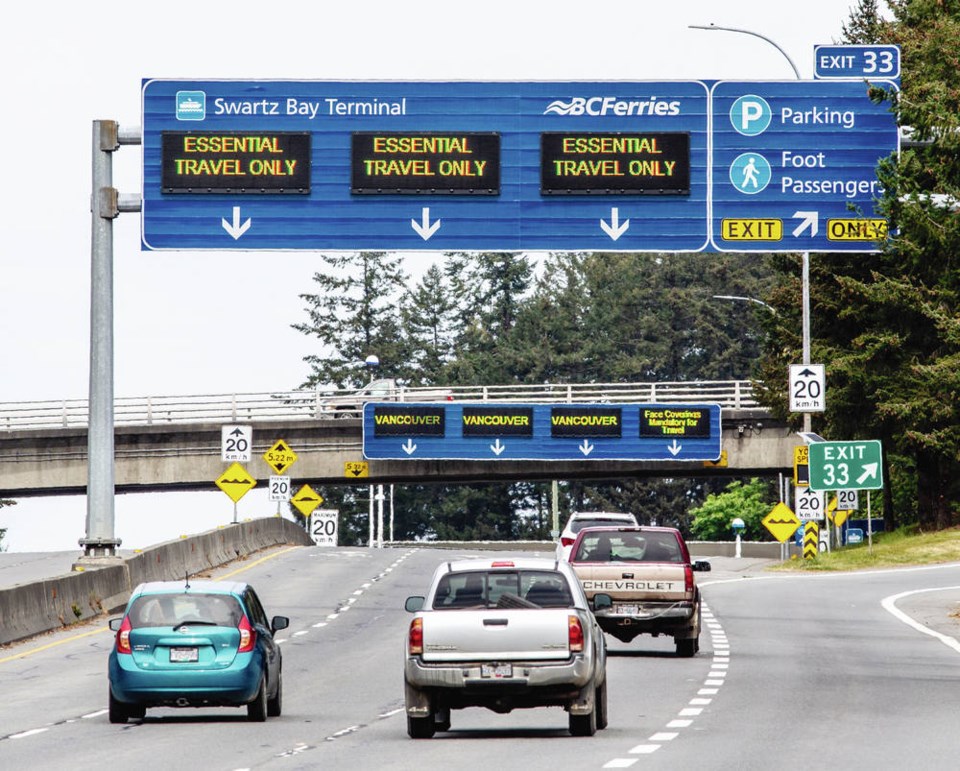The RCMP will conduct CounterAttack-style road checks to prevent travel between regions of B.C. and slow the spread of COVID-19, Solicitor General Mike Farnworth announced Friday.
But don’t expect to see any of the check stops on Vancouver Island. The government is leaving it to staff at B.C. Ferries to ask whether people are travelling for essential reasons such as going to work, moving or attending a funeral.
Police will only be called if necessary. “That’s what’s been taking place and it’s been working quite well so far,” Farnworth said.
He cautioned, however, that people should still be following the advice of provincial health officer Dr. Bonnie Henry and staying close to home — even within a particular region.
“I just want to make it clear to people that that does not mean that you go from Victoria to Courtenay or you go from Nanaimo up to Port Hardy,” he said.
“It still means that those travel advisories that are in place by Dr. Bonnie Henry are still there, which means stay local, stay in your own community, and that is the best way to help prevent transmission.”
A week ago, Farnworth issued an emergency order prohibiting non-essential travel between three new zones — Vancouver Island, Northern/Interior and the Lower Mainland/Fraser Valley.
The order, which remains in effect until May 25, had an immediate impact, the government says.
During the first weekend, vehicle traffic on B.C. Ferries was down 25 per cent and passenger traffic dropped 30 per cent. B.C. Parks reported more than 5,000 cancellations and resort communities received fewer out-of-region visitors.
Farnworth has now authorized a special RCMP unit to set up road checks on key corridors, such as the Coquihalla Highway, that link mainland zones. There will be no check stops within towns and cities, he said.
Police will be able to ask for a driver’s name, address and driver’s licence as well as any secondary identification that confirms their address in the event that they recently moved. They can also ask the purpose of travel.
Travel documents will not be required and passengers in the vehicle will not have to provide any information.
“If police have reasonable grounds to believe you are about to leave your regional zone or are already travelling outside of your health authority for non-essential purposes, they can direct you to stay within your region or to leave the authority at that time,” Farnworth said.
Drivers face a $230 fine for failing to comply and a $575 fine for violating the travel order.
But Farnworth said the primary goal of the road checks is to deter people from travelling for non-essential reasons.
“The intent of this order is not punishment, but rather to educate around travel,” he said. “Spreading this message continues to be more important than giving out tickets.”
He said the government is aware of concerns about the police being given “sweeping powers” and the potential for a disproportionate impact on some groups, such as Black or Indigenous people.
“I want to be clear: There is no authority for pedestrians to be stopped on the streets or for arbitrary inspections or investigations to be conducted by police. These enforcement orders apply to the site where the road checks are taking place.”
As well, police will only record personal information if a driver is in violation of the travel ban, he said.
The B.C. Civil Liberties Association said it was pleased to see a number of its concerns addressed in the order, but it continues to take issue with the expanded scope of police powers beyond what is normally permissible.
“We urge the province to strongly consider the impacts this order has on already over-policed communities. Both the expansion in police powers and the discretionary police power to enforce and issue fines runs the real risk of further entrenching systemic racism in policing,” it said.
The National Police Federation, which represents 7,000 RCMP members in the province, expressed concern last week that officers could be at risk from public backlash, “legal ambiguity” and possible infection.
Farnworth said the government has worked hard to make sure the order is constitutional and that any road checks will be safe for the officers and the public.
“I would also point out that police are in the priority group in terms of getting vaccinated, and I know that more than 2,000 RCMP officers have already been vaccinated,” he said.
The police federation said Friday that it was pleased that the order addresses many of its concerns and focuses on information and encouraging people to avoid unnecessary travel.
“We will continue to work with the RCMP on its implementation and to addressing member concerns,” president Brian Sauvé said in a statement.
The B.C. Ferry and Marine Workers’ Union said its members were uneasy about having to question customers about their reasons for travelling, but that most people have been co-operative.
“The company has assured us that they’ll have management there, supporting the lines, and if there is a situation that escalates, that’s not for us to decide that,” said Jack Bruckman, executive director. “Security professionals can deal with that.
“We want to give out ferry tickets to folks that are following provincial health orders. We’re not in the position to give out any other ticket. That’s for the police to do.”
— With a file from Cindy E. Harnett



